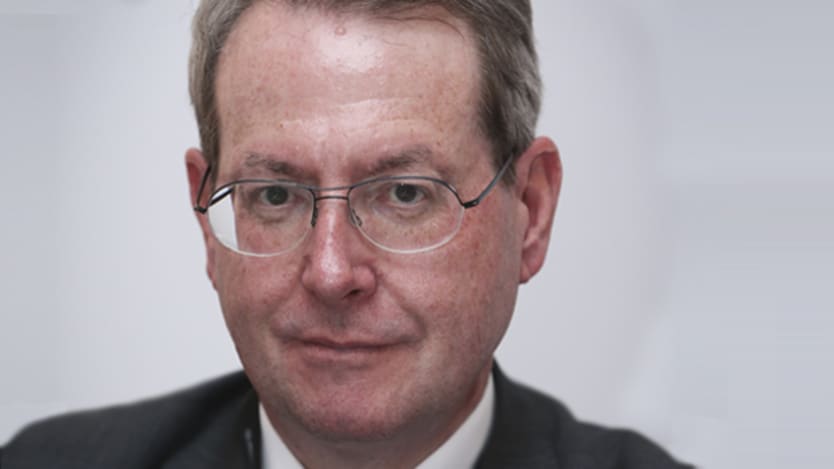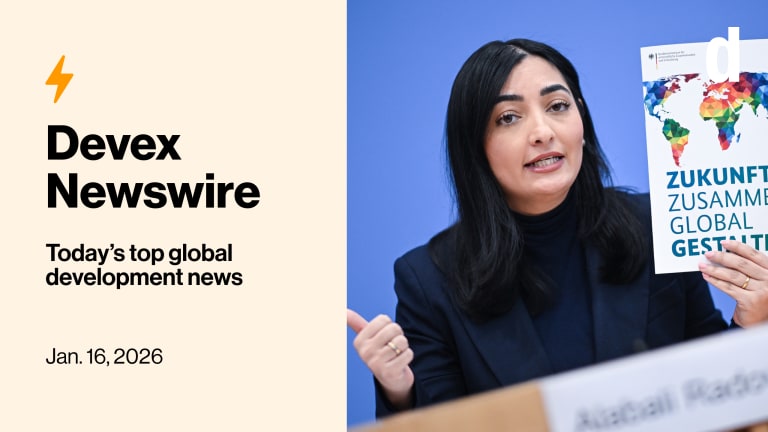
The potential for private sector investments in Africa is huge — and the massive financing gap on the continent is not as hard to fill as some might think.
“Filling the financing gap is quite easy: get things right by creating a regulatory environment that is conducive for the private sector, and the private sector will come," Bruno Wenn, CEO of the German Investment Corp. and chairman of the Association of European Development Finance Institutions, told Devex on the sidelines of the recent EU-Africa Business Forum in Brussels.
The forum, which brought together African and European business leaders, convened a high-level platform to discuss how to use the EU-Africa partnership for meeting today’s development challenges.
Wenn shared his views about the role private sector investments can play on the African continent. Here are some highlights from our conversation:
EDFI focuses on developing the private sector in emerging and developing economies. What is the potential role for new development implementers?
There are a lot of new opportunities because countries in Africa are changing ... We have seen it in Senegal, when five years ago the government changed the energy law, for the first time allowing the private sector to generate, distribute and transmit power, as well as feed power into the system. This has deployed the huge potential of private sector investments, allowing investors [to participate in] local private investments to provide renewable energy in very remote rural areas.
There is also huge potential in Uganda, because the government has introduced investment-friendly regulation. In Uganda today, there are cost-reflective tariffs, as well as PPPs and power purchase agreements that are recognized as being safe procedures between private energy producers and the public sector off-takers ... [in] South Africa last year the energy law was completely revised, more or less replicating the systems of Latin America. Now they are [launching] new tenders so that the private sector can propose and renew projects, subject to some pre-set conditions, which has generated huge interest among the private sector. Another example is Kenya, where we have already tested a power purchasing agreement.
There are also huge opportunities in West Africa — in Nigeria and Ivory Coast, for example — where governments last year liberalized and privatized a large part of the energy sector, and are [now] calling for private sector bio projects.
So is regulation the main obstacle for further private sector involvement, or is it stability?
In the energy sector, out of 54 countries in Africa, only a handful have a regulatory framework in place that is conducive to private sector investments. I don’t believe that Africa is a continent full of risk. We have to recognize that over the past 10 years, Africa has achieved the highest economic growth worldwide and has significantly progressed in terms of good governance and in tackling corruption. Africa has achieved a lot to improve the business climate: eight out of the 10 best performers for doing business in recent years have been African countries. The good developments in the continent aren't being adequately recognized by business people in industrialized countries. For us it is easier to assist companies from Latin America than convince German business people to invest in Africa. All the emerging countries are investing in Africa … but industrialized countries continue to see Africa as a land of risk and not a land of opportunity, unfortunately.
How can this mindset change, and what role will the private sector play in the post-2015 framework in this regard?
A relevant one. I am extremely happy that more and more governments and also the European Commission recognize the private sector as a key player when it comes to development, in order to create jobs, increase growth and reduce poverty. I see a lot of opportunities even in the social sectors, such as the health sector, the education sector and the water sector, where the private sector can be very helpful, not only in terms of financing but also in providing skills and know-how.
But is the private sector being harnessed sufficiently to fill gaps in official development assistance?
To be honest with you, I don’t believe in ODA any more. Now, I am very much convinced that for developing countries to become more independent, it would be more useful to look on the private sector not only in terms of foreign direct investments, but also take into consideration the local private investors.
Africa is full of informal businesses. Helping them to get access to long-term financing and to simplify accounting standards would lead them to grow and become more formal. As a German citizen, I strongly believe in SMEs, which provide huge opportunities.
Another sector completely ignored — or not fully understood — is agriculture. Africa is the only continent that has huge underused or unused potential. Africa could feed the world, if properly done, so we have to increase the productivity, increase mechanizations, increase infrastructure, skills and local financing. Business people should consider Africa as a business harbor.
Are there any emerging sectors that will attract African investment in the coming years?
Africa is investing heavily in cyber systems, which provide opportunities for IT companies to build up their services. I am convinced that in the years to come we will see a growing industry producing software. We also need to provide more support to SMEs [in this sector], because if they have access to simplified accounting standards for software, it will be easier for the banks to give them loans ... More and more people are investing in IT systems, services and making more of the mobile phone use available. This will certainly be a growing industry ... People in Africa are starting to use modern technology through the Internet to sell products, just as Asians and Latin Americans are doing. And through the Internet, we’ll soon be able to provide education services even in very remote areas ... Today Africa is a place to go as a business person, not only as a tourist.
Read more:
Private sector must be our partner in Africa — Piebalgs
EU: Let's turn on the light to help Africa prosper
Join Devex, the largest online community for international development, to network with peers, discover talent and forge new partnerships - it’s free! Then sign up for the Devex Impact newsletter to receive cutting-edge news and analysis every month on the intersection of business and development.








